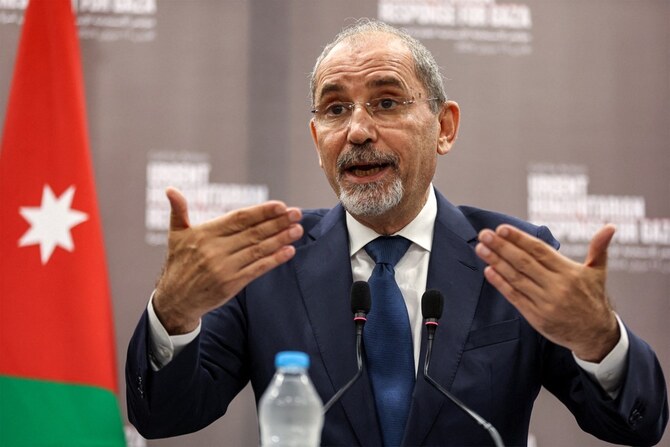NEW YORK CITY: A high-level meeting on the UN Relief and Works Agency for Palestine Refugee produced a “global vote of confidence” in the agency despite Israel’s “political assassination campaign” against it, Jordan’s foreign minister said on Thursday.
Ayman Safadi was speaking at a joint press conference with UNRWA Commissioner General Philippe Lazzarini following the meeting at the UN headquarters.
Safadi said: “Today rallied international support behind an agency which carries out heroic work in helping the Palestinian people through the misery that Israel continues to bring to Gaza.
“Nobody can do the job that UNRWA is doing. It’s irreplaceable. It’s indispensable. It’s needed now more than ever before.
“UNRWA and its staff made the ultimate sacrifice. Israel has killed 222 UNRWA staff members. It targets them. It doesn’t allow them to operate.”
Safadi said more than 50 countries attended the meeting. He hailed UNRWA’s “noble job” in saving the lives of thousands of Palestinian children from paralysis through a polio vaccination campaign.
The agency has become the victim of an Israeli “political assassination campaign” designed to undermine support for the Palestinian people, Safadi said.
It is “incomprehensible” that a UN member state would designate a UN agency as a terrorist organization, he added.
“That can’t happen, and we must stand against that,” Safadi said, because “it’s undermining the whole UN system, and the world mustn’t allow that, and we’ll stand up to it, along with all our partners who showed up in support of UNRWA today.”
He added: “We’ll continue to do everything to ensure that UNRWA stands because UNRWA is also a beacon of hope for Palestinians, and that’s why Israel has launched the political assassination campaign on UNRWA, because it wants to liquidate the cause of the Palestinian refugees, which shouldn’t be done and won’t be done.”
Lazzarini echoed Safadi’s words, describing the Israeli campaign against the agency as “relentless” and “coming from every corner.”
He said: “These aren’t just attacks against UNRWA. They’re attacks against the broader UN system, attacks against the broader international community.
“They aim, first, at stripping Palestinians from the refugee statute, but secondly, they aim at weakening or putting an end to the aspirations of the Palestinians for self-determination.”
The UNRWA chief said his agency and others, as well as international NGOs, have seen staff being “phased out” in the Occupied Territories as a result of Israeli practices.
Calls to dissolve UNRWA or end its presence in the Middle East would be “unconscionable, unprecedented, and would open an extraordinary Pandora’s Box,” Lazzarini warned.
To counter the Israeli campaign, “we’ll continue to push the true narrative that UNRWA deserves to be supported,” Safadi said.
“UNRWA deserves to be thanked for the tremendous sacrifices that it continues to do in the execution of its global mandate.”
Both officials described conditions on the ground in Gaza almost one year on from Israel’s invasion.
The UNRWA chief warned that the Palestinian enclave is a “place which definitely horrifies even the most seasoned humanitarians who’ve seen it all over the last 20, 30 years.”
He said more than 1 million school-age children in Gaza are “deeply traumatized” and living amongst rubble.
“An entire generation might be sacrificed if they aren’t brought back to learning,” he added. “Obviously learning in this environment is extraordinary difficult, but we’re trying to make sure that they lose as little as possible.”
Lazzarini discussed the financing of his agency, warning that the shortfall in funding from October to the end of the year stood at $60-$80 million.
But he said UNRWA would make sure to “bridge the gap” despite some donor countries signaling a decline in foreign aid due to austerity measures.
Lazzarini also highlighted UNRWA operations in Lebanon, saying shelters are now open to “not only Palestinian refugees, but also Lebanese and Syrian refugees.”
The UNRWA meeting on Thursday was backed by UN Secretary-General Antonio Guterres and French Minister of Europe and Foreign Affairs Jean-Noel Barrot.
“Virtually all donors have reversed their funding suspensions” to UNRWA, Guterres said in a statement, adding that “123 countries have signed up to the declaration on shared commitments to UNRWA.
“This underscores the consensus that UNRWA’s role across the West Bank and the region is vital. Friends, there is no alternative to UNRWA.”
Barrot said: “The role of UNRWA is necessary in the Gaza Strip to provide vital humanitarian aid to a civilian population of Gaza whose needs are immense.
“France pays tribute to the UNRWA personnel and to all the humanitarian personnel killed in Gaza while they were trying to rescue civilians.”
























